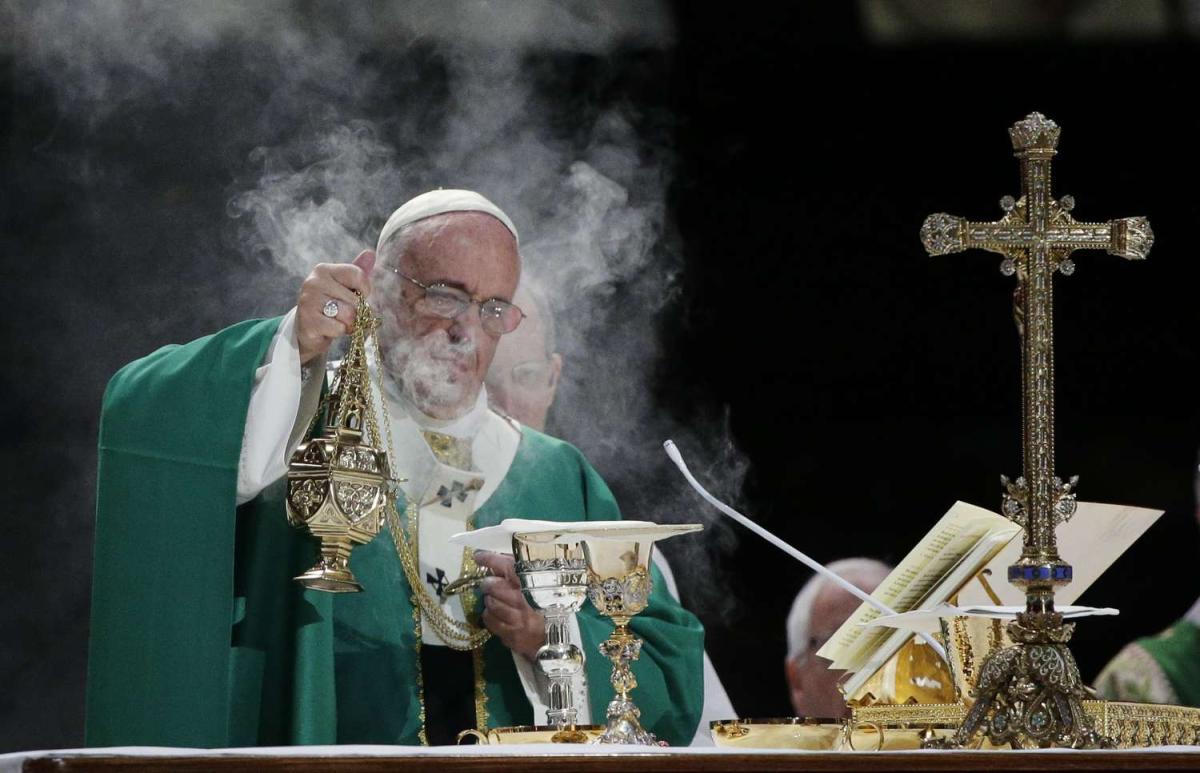Originally posted October 14, 2005.
You can read this entire series, for free, via the convenient Left Behind Index. This post is also part of the ebook collection The Anti-Christ Handbook: Volume 1, available on Amazon for just $2.99. Volume 2 of The Anti-Christ Handbook, completing all the posts on the first Left Behind book, is also now available.
“It’s hard to accept the idea that there cannot be an order in the universe because it would offend the free will of God and His omnipotence. So the freedom of God is our condemnation, or at least the condemnation of our pride.”
— Umberto Eco, “The Name of the Rose”
Left Behind, pp. 159-165
Rayford Steele and his daughter, Chloe, are reunited and trying to account for their situation. The events of the past few days were mysterious, inexplicable, or at least highly improbable. Yet they happened. There they are. So how did this come to be?
Rayford is sure he already knows: God did it.
This is how Rayford has decided to explain everything he cannot otherwise explain. The mass disappearances, he has decided, must be the product of some Intelligent Design.
Once he has reduced the almighty to the explanation of the otherwise inexplicable, it then becomes Rayford’s job to defend this fragile gap-God. Chloe can’t explain the disappearances either, but she’s willing to consider any theory. Rayford — like LaHaye and Jenkins — finds this kind of open-mindedness dangerous. After all, the more explanations we find for things, the more marginal the gap-God becomes.
Consider the birds of the air. More particularly, consider the finches of the Galapagos Islands. They neither sow nor reap, yet your heavenly Father cares for them. God has given them different kinds of beaks, each uniquely suited to a particular niche in the island’s ecosystem. For believers in the gap-God, this was evidence of divine majesty. Until the HMS Beagle arrived, that is, and Mr. Darwin reduced God’s portfolio by explaining how those finches adapted through natural selection.
For Rayford, Chloe’s quest for non-miraculous explanations for the disappearances is, like Darwin’s similar quest to understand the natural world, a threat to God.
Chloe first kicks around “the space invasion theory,” which she dismisses: “It just seems that if some alien life force was capable of doing this, they would also be capable of communicating to us. Wouldn’t they want to take over now or demand ransom to get us to do something for them?”
We’ve already considered this, of course. The point about a ransom demand is a good one, but that presumes they didn’t just take the tender little children for food.
Rayford doesn’t have the patience for this. “My logic has been stretched to the breaking point,” he tells Chloe. L&J seem to consider this a description of faith. It’s a poor substitute. Faith is “being sure of what we hope for and certain of what we do not see” (Hebrews 11:1). The breaking point of logic, on the other hand, is usually considered madness.
Here the story zig-zags a bit into one of those rare instances in which the characters briefly appear human. Rayford remembers a turning point in his relationship with his daughter. She had come home drunk from a party in high school and he had begun yelling at her. But his worry had overcome his anger and he broke down. “Though he hadn’t planned it, that involuntary show of emotion got through to Chloe. … He had dissolved into tears, and so had she. They had bonded as never before.” Yeah, it’s still written in Jenkins’ typical style (“bonded” as a verb, telling us that something was both unplanned and involuntary) but it’s the sort of thing that might actually occur between two humans, so I’m willing to give him a pass on this section.
For those of you keeping score at home, I’ll say this for the record: From halfway down page 160 to about halfway through page 162, Left Behind is not wholly irredeemable. But it doesn’t last.
Late in the day, Friday, Rayford and Chloe reluctantly agreed they should eat, and they worked together in the kitchen, rustling up a healthy mixture of fruits and vegetables.
So it’s Friday, is it? That might mean something if we could be sure what day it was when this story started, which L&J neglected to tell us. With Rayford napping at odd hours and Buck warping the space-time continuum by replacing a 15-hour drive with a two-day plane trip it’s hard to calculate exactly how much time has passed. Best guess: the disappearances were somewhere between two and three days ago.
So no one’s been shopping for at least three days, but the Steele’s kitchen still provides “a healthy mixture of fruits and vegetables.” The cataclysm that shut down transportation and communication systems apparently did not interfere with the magical delivery systems that cause fresh food and clean water to appear, ex nihilo, in our suburban American homes.
Halfway through this sullen meal of wilted lettuce, Rayford finally blurts out his theory about what happened to his wife and son: “I believe they are in heaven.”
“Oh, Daddy! There were some religious nuts at school who were saying that, but if they knew so much about it, how come they didn’t go?”
“Maybe they realized they had been wrong and had missed their opportunity.”
“You think that’s what we’ve done?” Chloe said, returning to her chair.
“I’m afraid so. Didn’t your mother tell you she believed that Jesus could come back some day and take his people directly to heaven before they died?”
“Sure, but she was always more religious than the rest of us. I thought she was just getting a little carried away.”
“Good choice of words.”
“Hm?”
“She got carried away, Chloe. Raymie too.”
Chloe can’t imagine any objection to Rayford’s theory other than “If they knew so much about it, how come they didn’t go?” L&J can’t imagine any objections or alternatives to this theory either. They seem to think they have created a scenario in which God — their God, the premillennial dispensationalist God of arbitrary prophecy checklists — is the only logical explanation. The characters in Left Behind share the authors’ lack of imagination.
Now Rayford was angry. “What’s more far-fetched than people disappearing right out of their clothes? Who else could have done that? Years ago we’d have blamed it on the Soviets, said they had developed some super new technology, some death ray that affected only human flesh and bone. But there’s no Soviet threat anymore, and the Russians lost people, too. And how did this … this whatever it was — how did it choose who to take and who to leave?”
“You’re saying the only logical explanation is God, that he took his own and left the rest of us?”
“That’s what I’m saying.”
So for Rayford, if it wasn’t the Soviets, it has to be the hand of God.
Rayford notes that “there’s no Soviet threat anymore.” He’s not just referring to the dissolution of the USSR, but to the events described earlier in this book in which the actual, visible hands of God appeared over Israel, wielding the divine X-Box controller and destroying the entire Russian fleet of nuclear missiles and fighter planes without the slightest harm befalling the people below.
Like the rest of the world, Rayford witnessed that explicit act of divine intervention without giving it a second thought. But now he is convinced that he has found evidence that demands a verdict?
By repeatedly insisting that a divine miracle is “the only logical explanation,” what LaHaye & Jenkins really mean is that there is no logical explanation — only supralogical ones. But once we enter the realm of miracle and the supralogical we lose any basis for preferring one supralogical explanation over any others. Irene Steele’s PMD rapture theory is one such supralogical explanation for the mass disappearances. Here’s another: The Dharma Initiative. Hurley fell asleep and failed to push the button after 108 minutes.
















